Incredible, but true: the healing properties of dill are stunning
Dill is a frequent guest on our menu. But it was not always so. In the Middle Ages, the plant was believed to influence human consciousness and was used exclusively in witchcraft. Later they began to use it as a medical drug and only then began to add it to food.
In the modern world, not everyone knows about the beneficial properties of dill. Meanwhile, all parts of the plant from root to seeds are used in traditional and folk medicine and have a positive effect on the health of men, women and even newborns. Considering that everything is healthy in moderation, let's figure out what, why and in what quantities should be consumed.
Chemical composition, trace elements, vitamins and plant structure
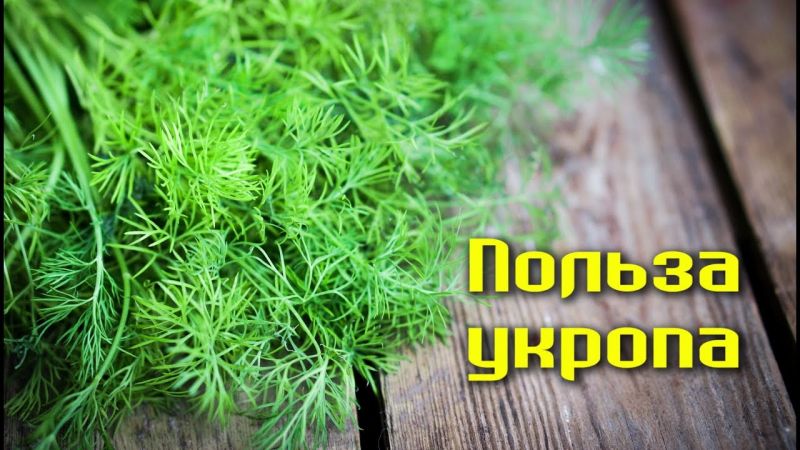
Dill is an annual umbrella plant and the only representative of its genus. The modest-looking bush is a popular aromatic spice and a storehouse of useful substances.
The concentrations of vitamins and minerals per 100 g of product (seeds, fresh and dried herbs) are shown in the table.
| Seeds | Fresh herbs | Dried herbs | |
| Vitamins | |||
| A (retinol), mg | 0,003 | 0,75 | 2,293 |
| B1 (thiamine), mg | 0,418 | 0,03 | 0,418 |
| B2 (riboflavin), mg | 0,284 | 0,1 | 0,284 |
| B4 (choline), mg | 13,2 | ||
| B5 (pantothenic acid), mg | 0,25 | ||
| B6 (adermine), mg | 0,25 | 0,15 | 1,71 |
| B9 (folic acid), mg | 0,01 | 0,027 | |
| C (ascorbic acid), mg | 21 | 100 | 50 |
| E, mg | 1,7 | ||
| K1 (phylloquinone), mg | 0,06 | ||
| PP (nicotinamide), mg | 2,81 | 1,4 | 2,81 |
| Beta-carotene, mg | 4,5 | ||
| Niacin, mg | 0,6 | ||
| Minerals | |||
| Iron (Fe), mg | 16,33 | 1,6 | 48,8 |
| Potassium (K), mg | 1186 | 335 | 3308 |
| Calcium (Ca), mg | 1516 | 223 | 1784 |
| Cobalt (Co), mg | 0,034 | ||
| Silicon (Si), mg | 1,6 | ||
| Magnesium (Mg), mg | 256 | 70 | 451 |
| Copper (Cu), mg | 0,78 | 0,146 | 0,49 |
| Manganese (Mn), mg | 1,83 | 1,26 | 3,95 |
| Sodium (Na), mg | 20 | 43 | 208 |
| Selenium (Se), mg | 0,012 | 0,027 | |
| Sulfur (S), mg | 34,6 | ||
| Phosphorus (Ph), mg | 277 | 93 | 543 |
| Chromium (Cr), mg | 0,02 | ||
| Zinc (Zn), mg | 5,2 | 0,91 | 3,3 |
In addition, dill contains:
- monoterpenes, which promote the release of glutathione, an enzyme involved in detoxifying the body and neutralizing carcinogens and free radicals;
- essential oils with bactericidal and antioxidant properties, stimulate bile secretion, improve intestinal motility;
- flavonoids (quercetin, isotramnetin, kaempferol), the effect of which on the body is a calming and antihistamine effect, as well as stimulation of the secretion of female hormones;
- proteins, fats, carbohydrates and dietary fiber - everything you need for a balanced diet.
What are the benefits of dill?
Healers of the Middle Ages and modern doctors are unanimous in the opinion that the composition and properties of dill have a beneficial effect on the human body. But depending on the gender and age of a person, its effect is expressed differently.
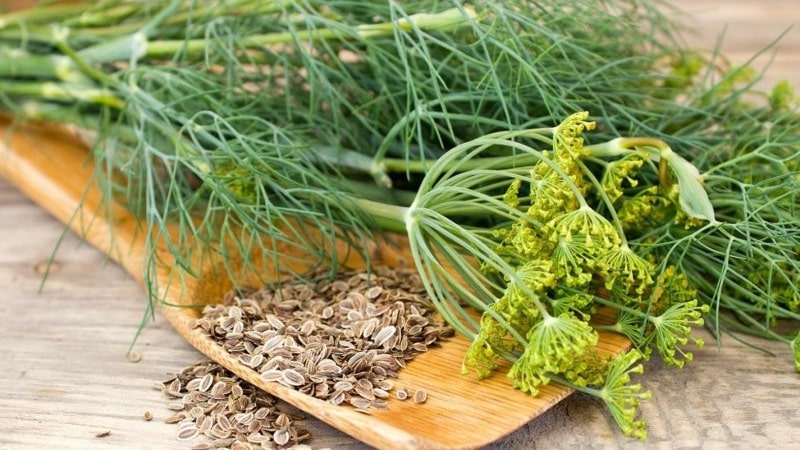
For women
Thanks to its saturation with essential oils, dill increases libido in women, stabilizes their hormonal processes, and reduces pain during menstruation.
The spice ideally complements the diets so beloved by women - its rich chemical composition and low calorie content (only 40 kcal per 100 g of fresh herbs) will diversify the menu and give energy to the body.
Reference. Dill is used in cosmetic products. Cosmetics based on this plant reduces skin pigmentation, tones it and improves complexion, smoothes out fine wrinkles, relieves inflammation and even reduces the severity of cellulite.
For pregnant
During pregnancy, many experience morning sickness, sudden mood swings or nervous disorders, and constipation. Dill will relieve such conditions or, at a minimum, improve your well-being and reduce the manifestations of ailments.
Iron and vitamin B9 contained in the plant will relieve anemia during pregnancy, vitamin C will strengthen blood vessels, and essential oils will have a calming effect. In addition, greens have a mild laxative effect and do an excellent job of removing excess fluid, which will help cope with swelling.
Important. When pregnant women consume dill, some of the vitamins are supplied to the fetus. Folic and nicotinic acids are useful for the formation of the central nervous system, and phosphorus, potassium, calcium and other vitamins of the group are involved in the formation of its nervous and vascular systems.
However, it is important for pregnant women to follow the dosage: in large quantities, dill affects the smooth muscles of the uterus, causing contractions, and can trigger early labor. It is advisable to consume fresh greens, and Take decoctions only after consulting a doctor.
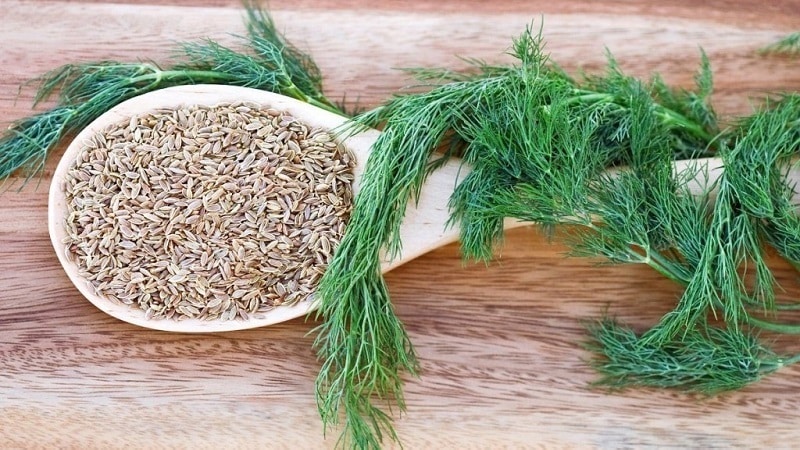
For nursing
To extend breastfeeding time, it is recommended to regularly drink herbal teas with the addition of dill seeds or dill water. If such teas are not to your taste, try adding fresh herbs to main dishes and salads.
The spice increases milk production and improves its quality characteristics, saturating it with vitamins.
For the elderly
During menopause, hormonal changes in the body occur, which affects well-being - irritability appears, sweating increases, and hot flashes bother you. Dill seeds, taken as a course in the form of powder or decoction, will help completely or partially get rid of the symptoms of menopause.
In addition, the grass contains a lot of calcium, so regular consumption prevents the development of osteoporosis, which is important in adulthood. And dried, crushed greens will gently reduce blood pressure, which is becoming more and more common over the years.
For men
Plant consumption or its derivatives has a vasodilating effect, helps clear the walls of blood vessels from plaques in atherosclerosis. As a result, blood supply to all organs improves, including those located in the pelvis, which has a positive effect on erection. Caucasian centenarians, who traditionally have a lot of dill and other greens in their diet, are famous for their potency “until deep gray hairs”.
In addition, greens have a beneficial effect on the functioning of the genitourinary system, which reduces the risk of prostate inflammation.
For newborns and older children
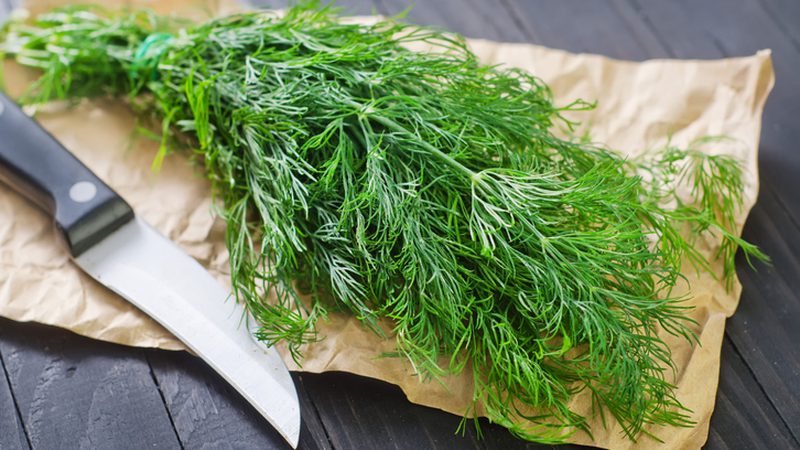
A newborn's digestive system is not yet fully formed; they are often tormented by colic from accumulated gases. Dill water is an effective solution in such situations. It is administered with a pipette a few drops into the mouth or mixed with breast milk: up to 1 month, 10 drops three times a day, up to 4 months - 20 drops, from one year - a teaspoon.
Important. As a rule, colic does not appear until two weeks of age, but if this happens, you should consult your doctor about the advisability of using dill water and the permissible dosage.
If a nursing mother drinks dill water or eats fresh dill, then the baby’s gases pass painlessly and the risk of colic is reduced.
Older children also have problems with bloating. They should increase the dose of dill water: three-year-olds can be given 60 ml three times a day, and from the age of 6 they can switch to an adult dosage.
Reference. Dill water can be made in different ways: traditional - from water and essential oil of fennel (dill), prepared at home - from seeds poured in boiling water or finely chopped herbs. The homemade drug is prepared fresh for each appointment.
Using the medicinal properties of dill
The fruits and essential oils of the plant are used in traditional medicine. But traditional medicine uses absolutely all of its parts: roots, stems, umbrellas, leaves, seeds. And the recipes created are aimed at improving human health in all areas.
In folk medicine
The medicinal properties of dill are used for a variety of diseases and conditions:
- For colds, coughs and sore throats, dill acts as an expectorant, antiseptic and analgesic, thinning mucus.
- Helps strengthen bones due to its high calcium content.
- Reduces blood pressure, treats headaches, improves potency due to the plant’s ability to dilate blood vessels and relieve spasms of smooth muscles.
- Essential oils act as a sedative and hypnotic, improve intestinal motility, reduce the formation of gases, and provide a laxative effect for constipation.
- Stimulates regeneration, healing wounds and relieving inflammation.
- Thanks to glutathione, it is considered an antitumor agent.
- Helpful for hematopoiesis, improves vision, stimulates the flow of bile, is useful for stable heart function.
- Eliminates colic in babies and increases milk supply in nursing mothers.
- Relieves swelling due to its diuretic effect.
In what form to use
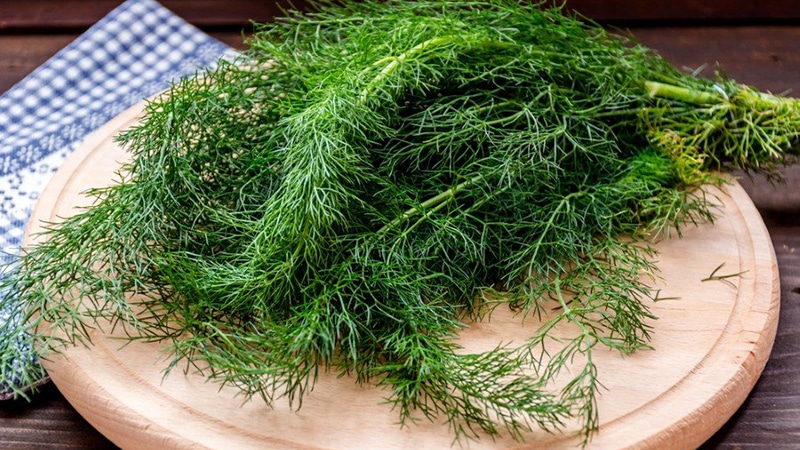
Depending on what we are going to treat and what substances contained in dill are used, different parts of the plant are used and processed to the desired state.
Fresh herbs
It is added to main dishes and salads, served separately. With regular consumption, it saturates the body with vitamins and microelements, energizes, and normalizes the functioning of the digestive system.
When used in hot dishes, greens are added at the very end so that they retain their beneficial properties. When crushed, it is suitable for infusions, decoctions and juice.
Dry
Used as blanks for the autumn-winter period for adding to dishes, preparing infusions and decoctions. Some recipes involve the use of dry dill, washed down with water.
Juice and decoction
The juice is squeezed out of chopped fresh herbs and used for oral administration, for lotions and compresses. A decoction is prepared from any parts of the plant: seeds, umbrellas, leaves (dry and fresh). As a rule, the decoction is more concentrated than the infusion.
Seeds
Well-ripened and dried seeds are used whole, crushed, or ground. They are added as a seasoning to food, made into infusions, decoctions and consumed whole with water.
Tincture
Fruits, umbrellas, roots or leaves are poured with boiling water and infused according to the recipe. Most often, the infusion is filtered and taken according to the scheme.
Oil extract
The product is obtained by pouring crushed dill seeds with sunflower or olive oil. The mixture is infused for a week, and the resulting dill oil is given to treat or support the body.
Other
Essential oils are used in aromatherapy and added to liquids for oral administration.The roots of the plant are suitable for decoctions and preparation of powder, umbrellas - for home preservation and preparation of medicinal preparations.
Collection and preparation of dill seeds
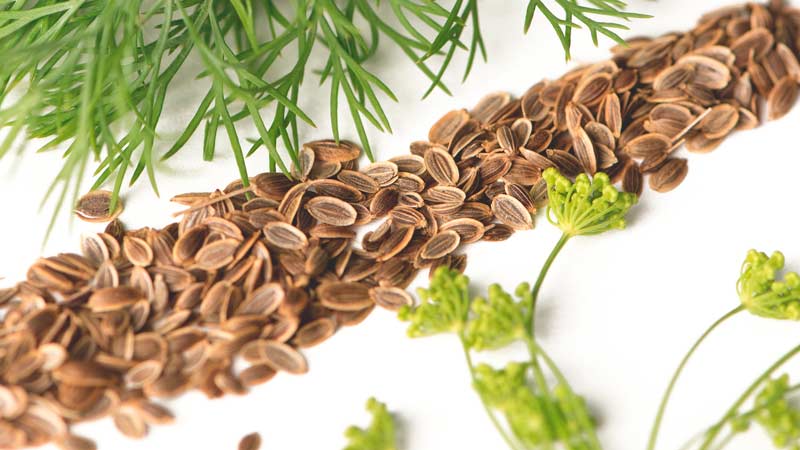
To get the maximum benefit from the fruits and ensure their safety, wait until they are almost completely ripened, preventing them from falling off from the wind. When the seeds have turned brown and the inflorescences have become dry, cut off the umbrellas with seeds, choosing a dry, sunny day.
Place the cut material in paper bags and leave in a warm, dry place without access to sunlight and with good ventilation for 7-10 days. As they fully ripen, the fruits themselves will fall into the bag.
You can do it differently and “scrape” the seeds from growing plants directly into the bag. After harvesting, dry the fruits by spreading them on cloth or paper in a warm, shaded place for several days.
It is advisable to store in airtight containers or thick linen bags. The average shelf life is 2-3 years.
Medicinal folk recipes based on dill
There are many recipes whose basic ingredient is dill. We have chosen the most effective and time-tested ones.
For high blood pressure, headaches and to prevent asthma attacks
For hypertension and to prevent asthmatic attacks, chew dill seeds after meals three times a day.
A freshly prepared decoction will help with blood pressure and headaches: 1 tbsp. l. dried seeds, pour 1 liter of water and place on the stove. From the moment it boils, leave to simmer for an hour over low heat. Then cool without opening the lid of the saucepan for two hours. Strain and drink 100 ml three times a day.
For headaches not associated with pressure, an infusion is recommended: 1 tbsp. l.crushed dill inflorescences, pour 300-350 ml of boiling water and leave for 40 minutes. You don't have to strain it. Gradually drink the resulting tea throughout the day.
For eye inflammation, injuries and wounds
Boil a tablespoon of dill in two glasses of water for 10 minutes. Stir and let cool. Soak a sterile bandage in the broth and apply compresses for 5-10 minutes to the eyes, wounds or injured areas. For each procedure, prepare a fresh portion.
During menopause
Grind the seeds into powder and take 1 tsp. twice a day 10 minutes after meals. The course is designed for 3-4 weeks - the average duration of the menstrual cycle. At the end of the course, the frequency of hot flashes decreases or disappears.
For potency, increased sexual activity and against premature ejaculation
To enhance erectile function or restore potency, the following recipe is practiced:
- Mix a tablespoon of crushed valerian roots and 0.5 cups of dill seeds with a glass of honey.
- Pour the mixture into 1 liter of boiling water and leave for 24 hours in a thermos.
- Take 1 tbsp. l. before meals.
Taking the spice affects not only the quality, but also the duration of sexual intercourse, making it longer.
From colic in newborns and to increase the lactation of a young mother
A tablespoon of crushed dill seeds or 2 tbsp. l. Pour a glass of boiling water over finely chopped fresh herbs and leave to infuse: fruits for 40 minutes, herbs for 60 minutes. The strained infusion is ready for use.
For colic, give the child three times a day, depending on age: up to four weeks - 10 drops, from a month to four - 20 drops, from a year - 5 ml.
For lactation, mother should drink 2 tbsp. l. 5-6 times a day 15 minutes before the next feeding.
For coughs, bronchitis and pneumonia and colds
Pour two teaspoons of fruit into two glasses of boiling water and leave in a thermos for two hours. Drink a quarter glass three times a day, adding 0.5 tsp before drinking. honey Honey enhances the expectorant effect of dill, softens the throat, complements the antiseptic properties of the spice and strengthens the immune system.
For parasites and as a carminative
Boil a tablespoon of seeds for 5 minutes in a glass of milk. Cool until warm and drink in two servings.
For insomnia and anxiety
Pour 25 g of dill seeds into a glass of fortified wine and simmer over low heat for 15 minutes. Leave for 1 hour, strain and squeeze the liquid from the seeds. Take 50 ml before bed.
For gallstones
Boil two tablespoons of dill seeds for 15 minutes in 400 ml of water. Strain. Drink 0.5 cups four times a day for 21 days. Warm slightly before use.
For pancreatitis
Grind the dill fruits to a powder and take 0.5 tsp. twice a day, washed down with water and honey.
Contraindications
Dill, despite all its usefulness, has several contraindications that are worth paying attention to:
- should not be taken if there is intestinal atony;
- for low blood pressure, take in moderate doses and monitor your condition;
- during pregnancy, especially in the last trimester, reduce the consumption of dill so as not to provoke premature birth.
For hypotension (low blood pressure), it is recommended to consume fresh greens in moderation and only after consulting a doctor.
Conclusion
Eating dill is not a panacea, but it can significantly improve your quality of life.This plant will help cope with many pathologies if you combine treatment with physical activity, proper nutrition and a positive attitude.